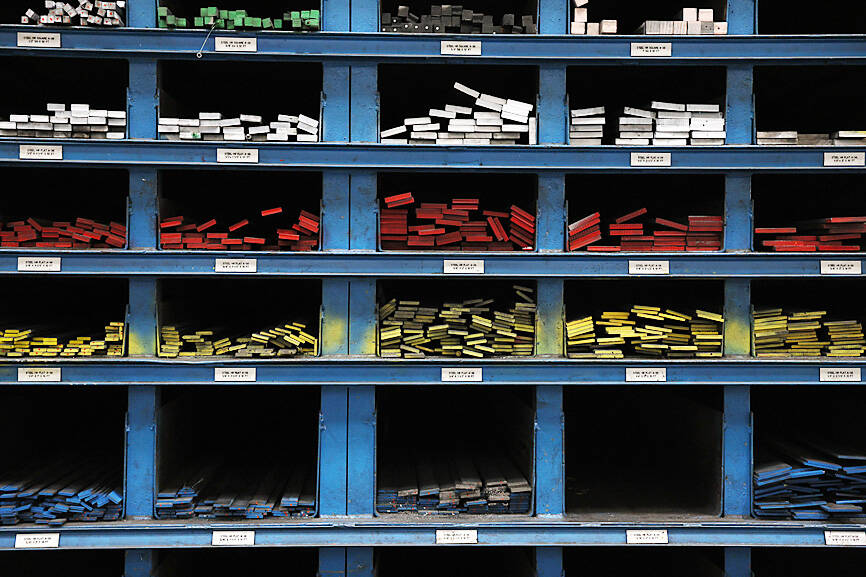US President Donald Trump yesterday officially increased tariffs on all steel and aluminum imports to 25 percent, while the EU announced its countermeasures.
European Commission President Ursula von der Leyen said that as the US was “applying tariffs worth US$28 billion, we are responding with countermeasures worth 26 billion euros (US$28.3 billion).”
The EU’s measures, which cover not just steel and aluminum products, but also textiles, home appliances and agricultural goods, are to take effect on April 1.

Photo: EPA-EFE
Trump promised that the taxes would help create US factory jobs at a time when his seesawing tariff threats are jolting stock markets and raising fears of an economic slowdown.
He removed all exemptions from his 2018 tariffs on the metals, in addition to increasing the tariffs on aluminum from 10 percent. His moves, based on a directive last month, are part of a broader effort to disrupt and transform global commerce. The US president has separate tariffs on Canada, Mexico and China, with plans to also tax imports from the EU, Brazil and South Korea by charging “reciprocal” rates starting on April 2.
Trump told CEOs in the Business Roundtable on Tuesday that the tariffs were causing companies to invest in US factories.
The 8 percent drop in the S&P 500 stock index over the past month on fears of deteriorating growth appears unlikely to dissuade him, as Trump argued that higher tariff rates would be more effective at bringing back factories.
“The higher it goes, the more likely it is they’re going to build,” Trump told the group. “The biggest win is if they move into our country and produce jobs. That’s a bigger win than the tariffs themselves, but the tariffs are going to be throwing off a lot of money to this country.”
Trump on Tuesday threatened to put tariffs of 50 percent on steel and aluminum from Canada, but he chose to stay with the 25 percent rate after Ontario suspended plans to put a surcharge on electricity sold to Michigan, Minnesota and New York.
In many ways, the US president is addressing what he perceives as unfinished business from his first term. Trump meaningfully increased tariffs, but the revenues collected by the federal government were too small to significantly increase overall inflationary pressures.
Trump’s 2018 tariffs on steel and aluminum were eroded by exemptions.
After Canada and Mexico agreed to his demand for a revamped North American trade deal in 2020, they avoided the import taxes on the metals. Other US trading partners had import quotas supplant the tariffs. The first Trump administration also allowed US companies to request exemptions from the tariffs if, for instance, they could not find the steel they needed from domestic producers.

The CIA has a message for Chinese government officials worried about their place in Chinese President Xi Jinping’s (習近平) government: Come work with us. The agency released two Mandarin-language videos on social media on Thursday inviting disgruntled officials to contact the CIA. The recruitment videos posted on YouTube and X racked up more than 5 million views combined in their first day. The outreach comes as CIA Director John Ratcliffe has vowed to boost the agency’s use of intelligence from human sources and its focus on China, which has recently targeted US officials with its own espionage operations. The videos are “aimed at

STEADFAST FRIEND: The bills encourage increased Taiwan-US engagement and address China’s distortion of UN Resolution 2758 to isolate Taiwan internationally The Presidential Office yesterday thanked the US House of Representatives for unanimously passing two Taiwan-related bills highlighting its solid support for Taiwan’s democracy and global participation, and for deepening bilateral relations. One of the bills, the Taiwan Assurance Implementation Act, requires the US Department of State to periodically review its guidelines for engagement with Taiwan, and report to the US Congress on the guidelines and plans to lift self-imposed limitations on US-Taiwan engagement. The other bill is the Taiwan International Solidarity Act, which clarifies that UN Resolution 2758 does not address the issue of the representation of Taiwan or its people in

SHIFT: Taiwan’s better-than-expected first-quarter GDP and signs of weakness in the US have driven global capital back to emerging markets, the central bank head said The central bank yesterday blamed market speculation for the steep rise in the local currency, and urged exporters and financial institutions to stay calm and stop panic sell-offs to avoid hurting their own profitability. The nation’s top monetary policymaker said that it would step in, if necessary, to maintain order and stability in the foreign exchange market. The remarks came as the NT dollar yesterday closed up NT$0.919 to NT$30.145 against the US dollar in Taipei trading, after rising as high as NT$29.59 in intraday trading. The local currency has surged 5.85 percent against the greenback over the past two sessions, central

US Indo-Pacific Commander Admiral Samuel Paparo on Friday expressed concern over the rate at which China is diversifying its military exercises, the Financial Times (FT) reported on Saturday. “The rates of change on the depth and breadth of their exercises is the one non-linear effect that I’ve seen in the last year that wakes me up at night or keeps me up at night,” Paparo was quoted by FT as saying while attending the annual Sedona Forum at the McCain Institute in Arizona. Paparo also expressed concern over the speed with which China was expanding its military. While the US